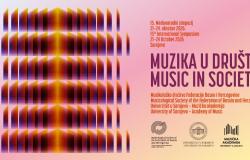Academician Dr. Mirko Pejanović delivered a lecture on BiH Statehood Day

The University of Sarajevo and the Faculty of Political Science of the University of Sarajevo organized a lecture on Wednesday, 20 November 2019 to mark the 25 November - Statehood Day of Bosnia and Herzegovina. Lecture on the topic: "The Significance of the ZAVNOBiH Session for the Development of Statehood of Bosnia and Herzegovina" was delivered by Academician Dr. Mirko Pejanović, University of Sarajevo professor emeritus.
The attendees were addressed by University of Sarajevo Rector, Prof. Dr. Rifat Škrijelj and Faculty of Political Sciences Dean, Prof. Dr. Sead Turčalo.
Rector Škrijelj stated that today, unfortunately, in many parts of BiH, the population does not remember this significant date for the state of Bosnia and Herzegovina.
“That generation that forgets the 25 November as BiH Statehood Day, that generation can only be held responsible for the disappearance of Bosnia and Herzegovina. Those who deny Statehood Day and receive high salaries from the state of BiH will never destroy Bosnia and Herzegovina. They will only make a contribution to make BiH stronger” said Rector Škrijelj.
Dean Turčalo added that the importance of ZAVNOBiH for the continuity of BiH's statehood was never sufficiently emphasized, but the fact that the foundations for the modern state of BiH were struck on that date.
University of Sarajevo professor emeritus, academician Dr. Mirko Pejanović, when speaking on the topic “The Importance of the ZAVNOBiH (State Anti-Fascist Council of People’s Liberation of Bosnia and Herzegovina) Session for the Development of the Statehood of Bosnia and Herzegovina” mentioned three ZAVNOBiH h particular emphasis on the first one when said the foundations of BiH's statehood were laid.
“With the first ZAVNOBiH session in 1943, an assembly of BH anti-fascists was held in Mrkonjić Grad. Many of them came from areas where war had already been fought, and for two days they decided and decided that their homeland would receive the status of a federal state unit equal to Serbia, Croatia, Macedonia, Slovenia and Montenegro. BiH, after centuries of existence under foreign rule, though in its territorial and administrative unit, gained statehood and established itself as a federal unit within a democratic Yugoslavia” said Academician Pejanović.
He emphasized that at that time BiH defined itself as a state federal unit in which equality of all peoples living in it would be guaranteed, and Josip Broz Tito had a significant role in establishing BiH as an equal unit in Yugoslavia.
“At the time, Tito said that BH peoples had participated massively in the liberation war and deserved a federal state unit within Yugoslavia, equal to Serbia and Croatia. The Second ZAVNOBiH Session of 1944 was held in Sanski Most as an assembly, and a well-known declaration on the rights of BiH citizens was adopted. At the third session in Sarajevo in 1945, the ZAVNOBiH was renamed in the National Assembly. That National Assembly will then decide on the election of the Constituent Assembly, which, two months later, adopts the first Constitution of BiH” emphasized Academician Pejanović.
He also referred to the current political situation in BiH and the frequent denial of its statehood.











